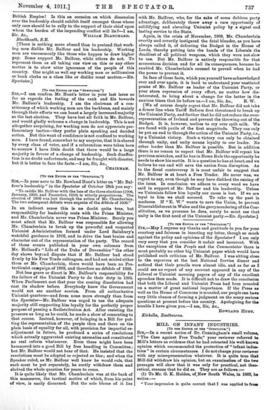rTo THE EDIT= OF THE "SFECTLTOR."1 SIE,—In your note to
Mr. Rowland Hunt's letter on " Mr. Bal- four's leadership " in the Spectator of October 28th you say : "To saddle Mr. Balfour with the loss of the three elections (1906, January, 1910, and December, 1910) is utterly preposterous. The election of 1906 was lost through the action of Mr. Chamberlain. The two subsequent defeats were sequelte of the dfbdcic of 1906."
In an indirect sense this is no doubt quite true, but responsibility for leadership rests with the Prime Minister, and Mr. Chamberlain never was Prime Minister. Surely you must admit that Mr. Balfour was responsible for allowing Mr. Chamberlain to break up the powerful and respected Unionist Administration formed under Lord Salisbury's watchful guidance in 1902, and to drive the best brains and character out of the representation of the party. The record of those events published in your own columns from Mr. Holland's " Life of the Duke of Devonshire" the other day shows beycnd dispute that if Mr. Balfour had stood firmly by his Free Trade colleagues, and had not misled either
them or Mr. Chamberlain, there would have been no Pro- tectionist campaign of 1903, and therefore no clibcicle of 1906.
Not less grave or direct is Mr. Balfour's responsibility for the failure of the Unionist Party to do their duty in 1905. When Parliament met that year the coming dissolution had cast its shadow before. Everybody knew the Government would not see another session. From all authoritative Unionist quarters—and from none more strongly than from
the Spectator—Mr. Balfour was urged to use the adequate majority still supporting him loyally for the perfectly proper
purpose of passing a Redistribution Act. After resisting the pressure as long as he could, he made a show of consenting to that course. Instead, however, of bringing in a Bill for put- ting the representation of the people then and there on the plain basis of equality for all, with provision for impartial re- adjustment in future, he produced a series of resolutions which actually aggravated existing anomalies and constituted no real reform whatsoever. Even these might have been
hammered into a good Bill by free handling in Committee ; but Mr. Balfour would not bear of that. He insisted that the resolutions must be adopted or rejected en bloc; and when the
Speaker ruled, as Mr. Balfour well knew he would rule, that each must be put separately, he curtly withdrew them and shelved the whole question for years to come.
It is quite likely that Mr. Chamberlain was at the back of this manoeuvre, the tactical motive of which, from his point of view, is easily discerned. But the sole blame of it lies with Mr. Balfour, who, for the sake of some dubious party advantage, deliberately threw away a rare opportunity of solidifying and elevating Unionist policy by a signal and lasting service to the State.
Again, in the crisis of November, 1909, Mr. Chamberlain overtly and covertly instigated the fatal blunder, as you have always called it, of defeating the Budget in the House of Lords, thereby putting into the hands of the Liberals the deadliest of all political weapons, which they were not slow to use. But Mr. Balfour is entirely responsible for that momentous decision and for all its consequences, because he enabled Mr. Chamberlain's counsel to prevail when he had the power to prevent it.
In face of these facts, which you yourself have acknowledged over and over again, it is hard to understand your unstinted praise of Mr. Balfour as leader of the Unionist Party, or your stern repression of every effort, no matter how dis- interested, to bring about a change for the better in the anxious times that lie before us.—I am, Sir, Ste., E. W.
[We of course deeply regret that Mr. Balfour did not take a firmer line when Tariff Reform firat threatened to break up the Unionist Party, and further that he did not reduce the over- representation of Ireland and prevent the throwing-out of the Budget. It is, however, useless to cry over spilt milk. We are faced with perils of the first magnitude. They can only be put an end to through the action of the Unionist Party, i.e., by a Unionist victory. Such a victory can only be obtained through unity, and unity means loyalty to our leader. No other leader than Mr. Balfour is possible. But in addition there is no reason to expect that Mr. Balfour will repeat his previous mistakes, and he has in Home Rule the opportunity he needs to show his mettle. It is a question he has at heart, and we believe he can and will save the nation from disruption. As to the fiscal controversy it is most unfair to suggest that Mr. Balfour is at heart a Free Trader. He never was, we regret to say, even though he may have disliked the raising of the issue. In conclusion we adhere to every word we have said in support of Mr. Balfour and his leadership. Unless we Unionists follow him loyally our cause is lost. If we are loyal to him we shall succeed. To rake up the past is madness. If "E. W." wants to save the Union, to prevent Disestablishment in Wales and the gerrymandering of the Con- stitution, as we presume he does, surely he must see that unity is the first need of the Unionist party.—En. Spectator.]






































































 Previous page
Previous page